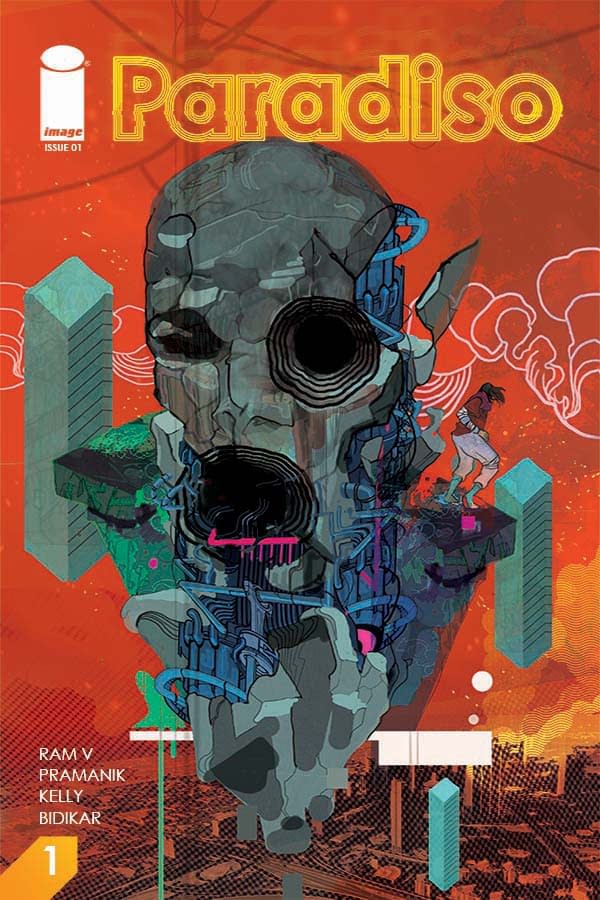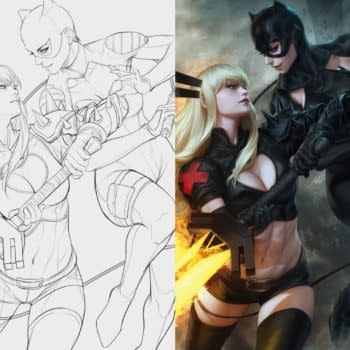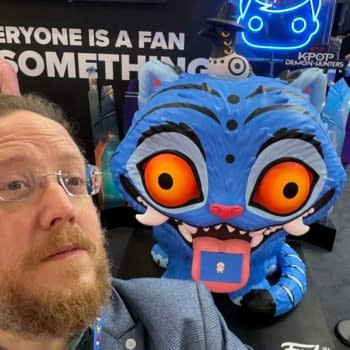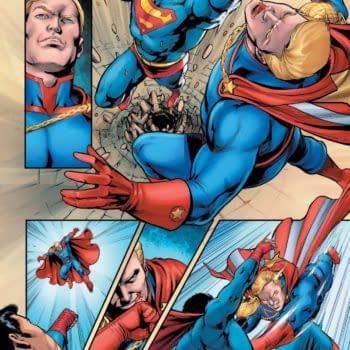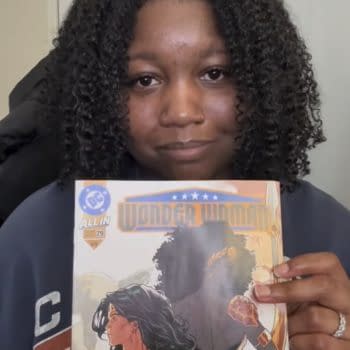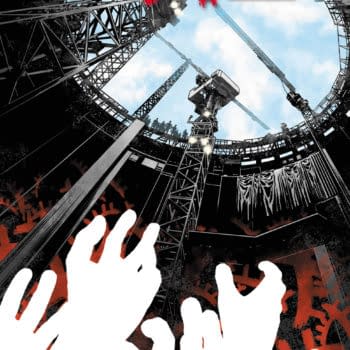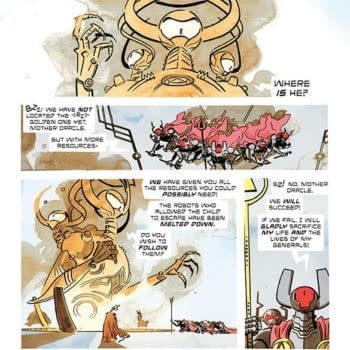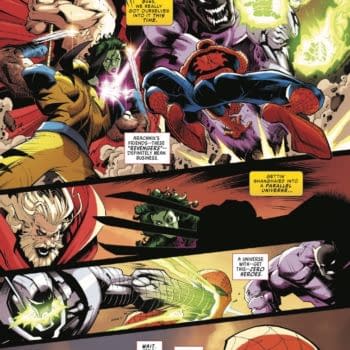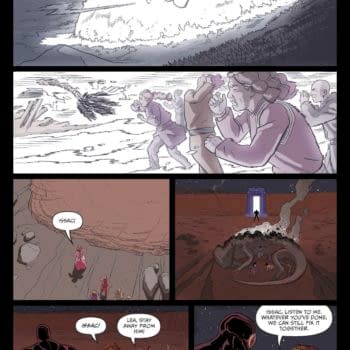Posted in: Comics | Tagged: Comics
The Making Of Paradiso From Image Comics: Indian Indie To White Noise
In 2014, Bleeding Cool ran a series of articles on the thriving Indian Comics scene. Writer, Ram V, was contributing short stories to anthologies and writing his indie series, Aghori, in India. Devmalya Pramanik was making comics for Graphic India and had just gotten his first international gig on Nightbreed for Boom! studios.
Now, in 2017, Ram's a regular at the London comics scene. With Devmalya Pramanik he's launching dystopian sci-fi book Paradiso at Image Comics in December and he's one of four members of the UK Writer's Studio, White Noise.
Ram and Dev talk about their beginnings in Indian Comics, making the leap to Image, their new book Paradiso , comics communities, working in studios and telling stories across borders.
Ram: Dev, you and I have had this discussion before. But, even in 2013 I was relatively new to the Indian comics scene. I know things are always difficult working in a still growing comics community but you made the switch from Engineering to art and comics much like I did, albeit at a younger age. What was that like?
Dev: I started working in Indian comics around 2011 and I was still in college at the time. My initial work was on a book called Daksh. I was very new to all of this and it was difficult to figure out how to manage my comics work in parallel to studying Engineering. The comics scene was quite sparse in India but there were still creators and publishers making comics. It was a place with fresh, new ideas. So, I always had work when I needed it but it did not pay professional rates. I had a couple of other creators who helped and guided me to make the transition from being an amateur artist to a professional but really it was only when I started getting projects from international publishers the difference in page-rates became apparent to me and it was shocking. By the time you and I began speaking I had already started looking for work internationally and the Nightbreed project happened.
I don't think we'd met in person when you moved to the UK. We were talking on emails but it was only after you went abroad that we started working on Black Mumba. And you've burst on to the scene from there, haven't you? What effect did moving to the UK and being close to the industry have, for you?
Ram: Well, I moved to study writing. A lot of my favourite writers came from the UK. Especially so, in comics. I was still unsure how I was going to turn a hobby into a profession. I remember, we'd finished the first few pages of Black Mumba and I walked around London Super Con showing it to creators. I knew Ron Marz, from his work with comics in India. I met him, Paul Levitz and Christian Ward among others. I did the same at Thought bubble and what I realised was that everyone wanted me to do well. Everyone was encouraging and welcoming. That felt very different to the way things had been in India. I got so much guidance and advice here in London. Kieron Gillen, Si Spurrier, Ivan Brandon, the White Noise crew before we were a studio- everyone was excited about the work you and I were doing and that was incredibly encouraging to a new creator like me. I don't think I'd have taken the jump into self-publishing Black Mumba without it or without the push from Ryan (O'Sullivan).
And now, PARADISO has seen so much support from everyone. Even before we pitched it, there were creators who were encouraging us to keep going. I remember showing the early pages to Christian Ward and he was excited about it, especially since he had seen your work before. He offered to do a cover for the book and what a cover it's turned out to be!
I'm glad, I'm also able to bridge that gap for people I'm collaborating with, now. I know I've passed on compliments and advice to you before from other creators that you admire. So, what's that been like? I know it kills you, not being here and not being able to talk to all the creators who inspire you. But I also know the joy you get when I tell you that your work is truly appreciated and loved. Now, you'll have Paradiso out at Image and that'll certainly find its way to readers, creators and editors. How're you feeling about that?
Dev: I grew up with DC and Marvel when I was a kid. And after a while I found Wildstorm and Top Cow and they were weirder and stranger characters and concepts. Some of them were pushing boundaries with the kind of stories they were telling. From there, I moved on to reading Image- Walking Dead, Invincible, Saga. It really expanded my horizons with what comics could be. I saw Image become the place for new and interesting narratives in comics. And ever since, it's been a personal goal to have a book at Image. Now that it's happening, I cannot possibly express how excited I am about it!
And of course, it is hard being insulated from creators in an industry that I feel like my work belongs in. So, it's difficult not being able to see people's reactions to my art and not being to talk shop with other creators. But even so, it's always brilliant to get their reactions online. I'm always overwhelmed by how much love there is for Paradiso .
I do wish I had more of that here, in India. We don't really have a comics community as much as there is a superhero and merchandise community. But there are people who've gone above and beyond in their appreciation of new stories and local, indie creators. For that I am always thankful. I think conventions and publishers in India should be working harder to develop a community. Both for fans and creators no matter what their tastes or their language. And I wish creators had a common platform where they could come together and not look at each other just as competition. I think if that happens, creators will influence each other and get excited about doing new, interesting work.
Whenever you come back from a convention and we talk about people's reactions to the work. That's always inspiring to me! It pushes me to do more interesting things. Work harder. Has that happened for you? How has your storytelling evolved now that part of the community, there? Now that you're working with other writers in the White Noise Studio, how does that help?
Ram: Yeah, more than anything else, for me, that was the aim with White Noise. I'd spent all these years pretty much in isolation with no real avenue for competent feedback or useful advice. When I met Ryan O'Sullivan and Dan Watters at Thoughtbubble, I knew they were writers with similar influences and an outlook toward stories and comics that I could agree with. A lot of it was informal at first. Exchanging scripts, talking through ideas. I met Alex Paknadel at London Super Con the next year. That was around the time we had all seriously started talking about putting a studio together.
Writing is still very much a solitary activity. But there is no point in being precious about it after you've put words down on paper. I trust the guys at White Noise to take my scripts apart. To question my ideas. To poke holes in my plots. And I take them seriously because I know how good they are. Because I admire their work.
There is still competition. But it comes from a very different place. It comes from wanting to improve and constantly get better and more innovative with the work. I think it's the same for everyone. Ryan has the incredible VOID TRIP out soon with Image. Dan and Alex are both working on unannounced but very exciting things with big publishers. We've all got creator owned books green-lit at publishers next year. And we're talking about innovative things that we want to do in the future as well. Part of that has to be the cumulative influence of the studio.
So, has my storytelling improved from being part of the White Noise crew? Absolutely! But more importantly, I'm not averse to taking risks or trying new things in my comics because I know there are people whose opinions I can trust when it comes to feedback on whether it all works.
I can see, that happened with all of you back in India too. Everyone who worked on Black Mumba has kept in touch. I know, some of the guys have been at life-drawing sessions. I've also put the White Noise crew in touch with some incredible artists in India. People like Kishore Mohan and Rosh whose work deserves to be on a bigger platform. Aditya has always been somewhat brilliant with his lettering. It's incredible to see the width of work that he's done in international comics now. I am excited to see what happens when more creators and artists from India start doing work with international publishers in comics. I know Abhishek Singh did Krishna at Image and that was such a beautiful book. I'd love to see that happen more often!
Dev: Yeah! And the influence is reciprocal, isn't it? I mean, just with PARADISO, it has been so cool to with work with Dearbhla on the colours and with Lizzie on editing.
The spectrum of stories in India will also improve and change with that sort of influence. Good science fiction is such a rare thing in Indian comics. But, here we are doing a dystopian sci-fi story. I think genres will explode and change. And, creators across the world will have more insight into a different culture and a different place. I see a lot of discussion in international comics on diversity. I think the field will only be enriched by getting creators from different cultures to work across borders. There will be genuinely new content told by voices that are intimately familiar with the stories they are telling. I hear people say it so many times, 'there are no original stories.' No, I think there are yet original stories to be told and read and loved. People need only look beyond their own comfort zones to see where original stories will come from.



